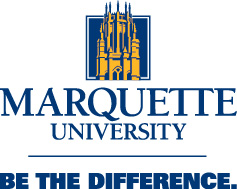|
May 27, 2020
Marquette experts provide commentary on coronavirus
President Michael R. Lovell discussed the upcoming fall semester amid the pandemic, including the need for more federal guidance with regards to testing. “This testing is going to cost money, and many academic institutions are already going to be fiscally challenged,” President Lovell said. “There’s not a clear path from an institutional point of view.”
Story appeared in the Associated Press, May 21, 2020
Provost Kimo Ah Yun was mentioned in a story about colleges and universities shifting academic calendars ahead of a second wave of COVID-19 cases as predicted by the Centers for Disease Control and Prevention.
Story appeared on Business Insider, May 20, 2020
Similar story about the university’s plans for fall appeared in Diverse Issues in Higher Education, May 21, 2020
Dr. Paul Nolette, associate professor and chair of political science in the Klingler College of Arts and Sciences, and Dr. Charles Franklin, director of the Marquette University Law School Poll, spoke in separate stories about mail-in voting for the 2020 presidential election amid the pandemic. Nolette touched on the role Texas Attorney General Ken Paxton is playing in the fight against voting by mail. Franklin described how the Trump administration views mail-in voting as a threat to election security and more.
Stories appeared on CNN and Politico, May 21-23, 2020
Dr. Karen Ross, visiting assistant professor of theology in the Klingler College of Arts and Sciences, wrote about how social distancing should not be a woman-only virtue. “Sentiments like ‘real men' don't wear masks’ or ‘do what you want’ in the face of public health guidelines directly endanger the populations most vulnerable to COVID-19,” Ross wrote. “And they present a false dichotomy between science and religion. Equally harmful are messages that take advantage of virtues such as care and consideration by only applying them to women and girls for the maintenance of patriarchal structures.”
Story appeared in the National Catholic Reporter, May 21, 2020
Dr. Maria Parés-Toral, director of online pedagogy and e-learning production, discussed the ins and outs of online learning as the school year — which transitioned to a virtual format a result of the pandemic — comes to a close. “Distance learning has been around for decades,” Parés-Toral said. “It has over the years become more sophisticated as technology has evolved and become available, and as learning and teaching research has evolved — (determining) the best practices of setting up a course online so that students can be successful. Currently, courses are hosted in a platform and learning management systems such as D2L, Compass and MOOC. Everything is organized in there for the students.”
Story aired on Wisconsin Public Radio, May 20, 2020
Dr. John Grych, professor of psychology in the Klingler College of Arts and Sciences, provided tips on how to regulate emotions for those struggling with mental health during the pandemic. Some tips include exercising and spending time outdoors. “Emotions have a physical basis,” Grych said. “When we engage our bodies, we can help work through and express our emotions in a way that’s constructive and healthy.”
Story appeared on SELF, May 21, 2020
Dr. Kent Belasco, assistant professor of practice and director of the Commercial Banking Program in the College of Business Administration, discussed how Citibank is buying Paycheck Protection Program loans. Belasco said banks want to be viewed as a go-to place for pandemic relief. “Citi says it doesn’t anticipate making any profits from the loans it takes on,” Belasco added. “That bodes well from a reputation standpoint.”
Story aired on NPR’s Marketplace, May 21, 2020
Dr. Howard Fuller, distinguished professor of education, co-wrote a piece about how the pandemic has further exposed racial inequities. “In our quest to figure out what to ‘do’ and how to ‘be’ during this weird, socially distant and emotionally draining time, the two of us find ourselves reflecting on something we’ve both known for years: the scales are unbalanced, be it from a racial, gender or socioeconomic status,” Howard wrote. “As pleasant and uplifting as the phrase intends to be, saying ‘we are all in this together’ is a fictional statement that discounts the reality that millions of people experience every day.”
Opinion piece appeared on AFRO (The Black Media Authority), May 20, 2020
Dr. Julia Azari, associate professor and chair of political science in the Klingler College of Arts and Sciences, discussed the pros and cons of an unprecedented shift to a more virtual Democratic National Convention. Azari said if the pandemic is still keeping tens of millions of Americans at home in August, a captive audience could help stem a drop-off in convention viewership. “We’re at a point where a lot of people are still primarily at home and it’s been a golden age of these live TV events,” Azari said, adding, though, it could limit the ability of minority factions in the party to command attention and leverage their voice.
Story appeared in the Milwaukee Journal Sentinel, May 22, 2020
Azari also spoke on the Bulwark Podcast on May 21 about potential Democratic vice-presidential candidates.
Marquette in the news
Center for Supply Chain Management names Babu new director
Dr. Manoj Babu has been named director of the university's Center for Supply Chain Management. Currently an instructor of practice in Marquette’s College of Business Administration with an extensive background in industry and higher education, he will begin in his new role July 1. Babu will be responsible for leading one of the college’s flagship centers, which is currently ranked in the top 20 nationally by U.S. News and World Report, Gartner Inc., and SCM World.
Story appeared in the Milwaukee BizTimes, May 20, 2020

|